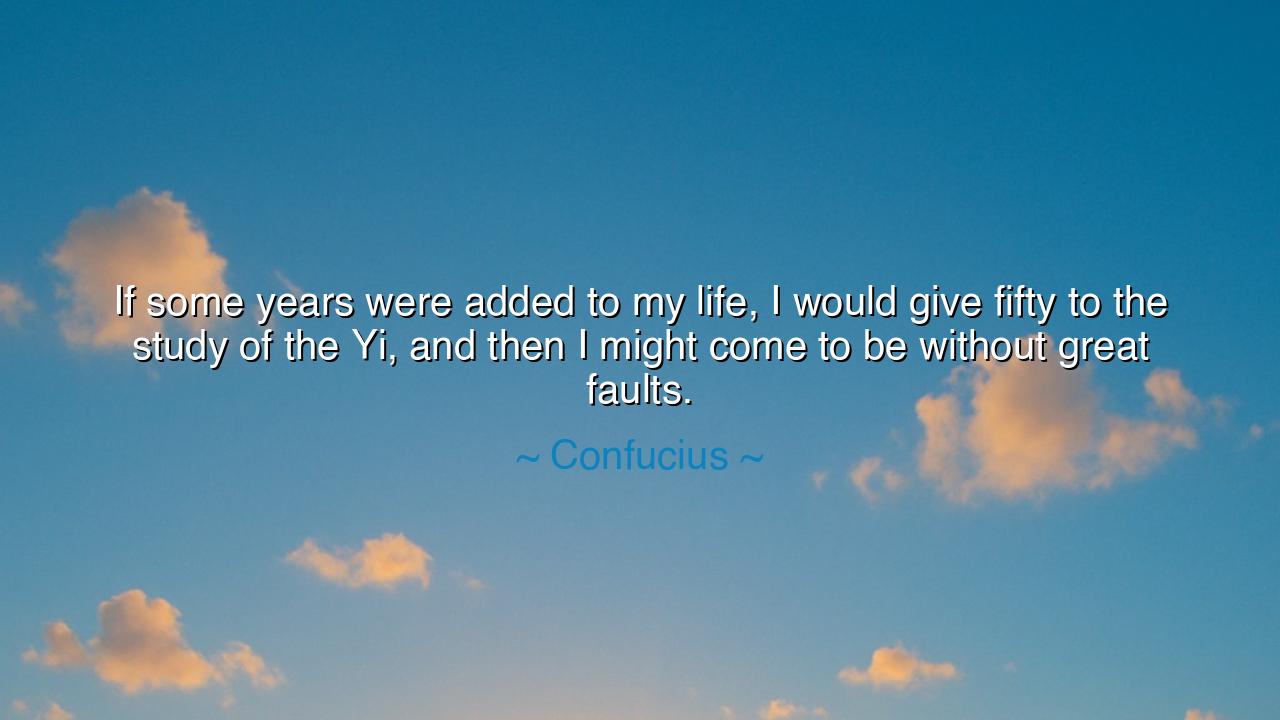
If some years were added to my life, I would give fifty to the
If some years were added to my life, I would give fifty to the study of the Yi, and then I might come to be without great faults.






"If some years were added to my life, I would give fifty to the study of the Yi, and then I might come to be without great faults." — Confucius
Thus spoke the great sage of the East, Confucius, near the twilight of his life. These words, humble yet profound, reveal a truth that shines like a lantern across the centuries: that wisdom is endless, and that even the wisest of men remain students before the vastness of truth. In these words, we hear not the pride of a master, but the reverence of a seeker — one who understood that self-cultivation is a journey without end. The Yi, or Book of Changes, was to him no mere text, but a living mirror of the universe, a reflection of the eternal patterns that govern both heaven and man.
To study the Yi was to study the flow of existence itself — how things rise and fall, how strength transforms into softness, and how harmony is found not in resisting change, but in understanding it. Confucius believed that in this ancient book lay the principles by which a man could align his heart with the rhythm of heaven, and thus be without great faults — not perfect, for perfection belongs to the divine, but balanced, wise, and true. Even in his later years, the Sage longed for more time to deepen his understanding, for he knew that one lifetime is but a single page in the scroll of learning.
In these words is also a lesson in humility. Here is Confucius, who shaped empires and minds, admitting that he had yet to reach the summit of virtue. How rare it is for greatness to bow before mystery! Yet that is the mark of true greatness — not to claim mastery, but to remain forever a disciple of wisdom. The shallow man believes he knows enough; the wise man trembles before the infinite. The Yi, with its symbols of change, reminded Confucius that all things evolve — and that even the soul must learn to move with the tides of understanding.
Consider the story of Emperor Kangxi of the Qing Dynasty, one of China’s most enlightened rulers. Though he wielded power over millions, he was known to spend long nights poring over the Book of Changes, seeking to comprehend its cosmic wisdom. He once said that rulership without philosophy was like sailing without stars. His reign was marked by peace and prosperity, for he ruled not merely by decree, but by alignment with the principles of heaven and earth — the very harmony the Yi teaches. In this, he embodied what Confucius had sought: to rule oneself and others through understanding, not domination.
The Yi Jing, or Book of Changes, teaches that nothing in life is fixed. Day becomes night; strength fades into gentleness; loss prepares the ground for renewal. To study it is to learn patience, resilience, and perspective — the understanding that change is not chaos, but the language of heaven. When Confucius said he would dedicate fifty years to it, he was not chasing knowledge for its own sake, but seeking unity with the natural order, that sacred balance where one’s actions are guided not by impulse but by insight.
The lesson, then, for all who walk the path of life, is this: never cease learning, for ignorance is the root of all error, and wisdom is the light that dispels it. Let no age, no title, no comfort make you believe that your education is complete. To live without seeking truth is to walk through a garden blindfolded — surrounded by beauty, yet unable to behold it. To study the Yi is not to read a book, but to study yourself, the seasons, the patterns of your heart, and the unseen harmony that binds all things.
So, my child, heed the teaching of the Master. Approach wisdom as a humble pilgrim approaches a sacred mountain — step by step, with awe and endurance. When life brings change, do not fear it; instead, read it as one would read the shifting lines of the Yi. Seek understanding in every joy and sorrow, in every rise and fall. For only through lifelong reflection and devotion to truth can one hope, as Confucius dreamed, to be without great faults — not perfect, but in harmony with the eternal rhythm of heaven and earth.






AAdministratorAdministrator
Welcome, honored guests. Please leave a comment, we will respond soon